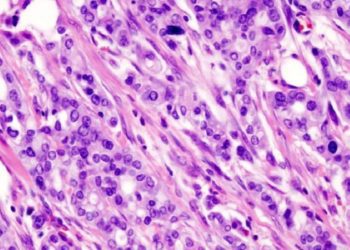Neuroendocrine tumor marker pancreastatin may be predictive of survival
Image: CC/Wiki
1. High pre- and post-operative levels of pancreastatin were significantly correlated with shorter progression free survival (PFS) and overall survival (OS) of neuroendocrine tumor (NET) patients.
2. Pre-operative levels of chromogranin A, a widely used NET biomarker, had no significant correlation with patient survival in multivariate analysis.
Evidence Rating Level: 2 (Good)
Study Rundown: Tumor resection remains the first-line therapy for pancreatic NETs (PNETs) or small bowel NETs (SBNETs), though recurrence rates are high. The ability to predict the response and survival of patients after tumor resection may aid clinicians in determining subsequent treatment courses (e.g. more or less aggressive therapies). This study examined the potential of NET biomarkers to predict patient outcomes after surgery. They found that high patient levels of pancreastatin both before and after tumor resection were indicative of lower PFS and OS. Other known NET biomarkers did not provide such comprehensive prognostic information. Importantly, pancreastatin is a relatively robust NET biomarker. It can be assessed via a standardized assay, is relatively immune to non-specific effects and is closely correlated with tumor burden. As such, this biomarker may provide a valuable prognostic tool in determining the best course of action for NET patients after tumor resection. This study is limited by its retrospective nature.
Click to read the study in Annals of Surgical Oncology
Relevant Reading: Serum pancreastatin: The next predictive neuroendocrine tumor marker
In-Depth [retrospective cohort]: This study included patients undergoing surgery on SBNETs (98 patients) or PNETs (78 patients) between 1999 and 2013. Laboratory measurements of the NET biomarkers chromogranin A, neurokinin A, pancreastatin, and serotonin were collected at median dates of 30 days pre-surgery and 124 days post-surgery. Only levels of chromogranin A and pancreastatin were strongly correlated with both PFS and OS (p < 0.05 for all). Surprisingly, when confounding factors (including primary tumor site, age at surgery, and nodal versus metastatic tumor) were accounted for using multivariate analysis, it was found that pre-operative levels of chromogranin A were no longer predictive of PFS or OS. Pancreastatin remained significantly correlated to both patient PFS and OS whether considered in multivariate analysis. Patients with high pre-op pancreastatin (> 135 pg/mL) had lower median PFS (1.7 years, p < 0.001) and OS (9.1 years, p = 0.048). Correlations of post-surgery biomarker levels with patient survival largely mimicked the findings for the pre-surgery biomarker levels, with pancreastatin remaining the strongest candidate for patient survival predictions.
More from this author: Initial kidney transplant factors may provide insight into retransplant success
©2012-2014 2minutemedicine.com. All rights reserved. No works may be reproduced without expressed written consent from 2minutemedicine.com. Disclaimer: We present factual information directly from peer reviewed medical journals. No post should be construed as medical advice and is not intended as such by the authors, editors, staff or by 2minutemedicine.com. PLEASE SEE A HEALTHCARE PROVIDER IN YOUR AREA IF YOU SEEK MEDICAL ADVICE OF ANY SORT.






